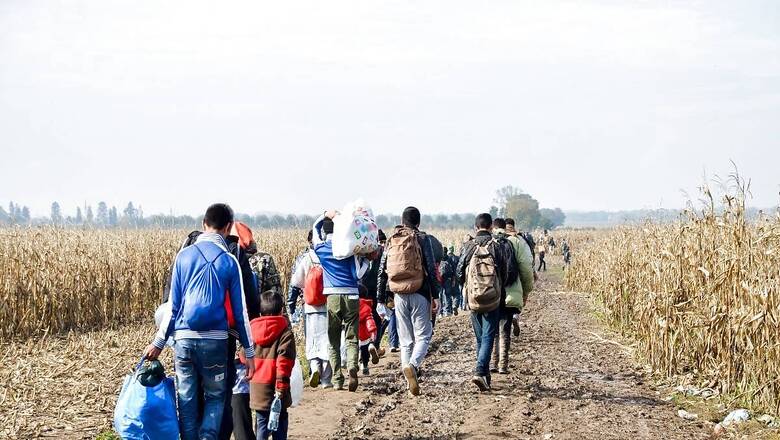
views
Climate change has been increasingly recognised as a significant driver of forced migration, as it, directly and indirectly, affects the habitability of certain areas, making them uninhabitable or unsustainable for human populations. Millions of individuals, communities and societies, over the last decade, have been compelled to leave their homes in search of food, life security and alternative livelihoods. To India, the story is no different.
The frequency and severity of extreme weather events in India became a topic of concern with the New Delhi-based Centre for Science and Environment (CSE) reporting that India experienced almost one extreme weather event per day. The Climate Action Network South Asia (CANSA) reports that approximately 45 million people in India alone, shall be compelled to migrate by 2050 due to climate disasters, with a threefold increase in current figures.
Not my Problem won’t work
Climate change displacement is not an individual problem but a multifaceted issue that affects communities, regions and countries. It strains social and political systems, exacerbating existing inequalities and creating new challenges for governance and public services. The cross-cutting issue often leads to consequences in the long term which are usually ignored. Often people and authorities do not take it seriously because it doesn’t impact them directly. But the long-term consequences are usually overlooked. These include population health of communities/regions, rapid urbanisation associated slum growth, and stalled development. Furthermore, displaced people frequently require access to essential resources and services like food, water, housing, healthcare, and education. This increased demand may tax local and national resources and result in higher service costs, putting additional strain on already stressed finances.
The overall economic impacts of climate change displacement can be significant as disruptions in agriculture, fishing and tourism can result in reduced economic growth, increased poverty, and inequality. When families relocate, they lose contact with the land. As a result, the interdependence, efficiency, and economics of associated livelihood activities such as animal husbandry, poultry, dairy, and so on suffer. Disruption of agricultural activity can also result in higher food costs and decreased availability of specific crops, which can have repercussions on a country’s broader economy, including implications on food security, employment, and commerce.
According to data from the Internal Displacement Monitoring Centre (IDMC), 3,856,000 individuals were displaced by environmental catastrophes in India in 2020, 989 times more than the 3,900 people who were affected by conflicts. Women, without a doubt, are often disproportionately affected by climate change-induced displacement in India and other parts of the world. A report by Climate Action Network shows that women perform additional 12–14 hours of work as a result of climate displacement and migration. When men migrate or leave vulnerable areas due to climate-related events, women are often left behind to take care of both the household and the land. In addition, when women are displaced, it often disrupts social networks and support systems that women rely on for their health, well-being and even financial management.
Homes in Peril
Despite the forced migration of people from rural to urban areas, due to the impacts of climate change rendering their former homes inhospitable, the relocation to urban areas often results in the creation of informal settlements with inadequate access to basic necessities such as water and sanitation. These overcrowded urban slums, lacking proper infrastructure and resources, pose significant challenges to the well-being and sustainability of their inhabitants. Our cities are ill-equipped to handle the influx of large numbers of people, and this trend may ultimately lead to a vicious cycle where cities also become unsustainable and uninhabitable due to the overwhelming burden of increased population density.
While we can take steps to lessen the effects of climate change, there will still be some degree of displacement. With several million people expected to migrate in India itself, there is a need to have a shift in how we think about climate and disaster programs and policies. As a result, efforts should be made to address the needs of people who are displaced, including offering assistance with relocation, chances for employment, and social welfare programmes. We need to rehome people in an orderly manner.
The issues of migration and displacement brought on by slow-onset climate change events are urgently needed to be addressed because current national policies are predominantly focused on short-term and abrupt onset climate disasters. This calls for a multifaceted, cross-sectoral, and global strategy that takes into account the long-term character of these occurrences and their effects on vulnerable groups. This entails acknowledging the rights and vulnerabilities of impacted people, creating early warning systems, improving adaptive capacity and resilience, and advocating sustainable solutions for communities that are being uprooted.
Needless to say, it would be in India’s interest to come up with preventive strategies, mitigation plans and comprehensive policies at the earliest to deal with what’s coming towards us in the near future.
Mahek Nankani is Assistant Programme Manager, The Takshashila Institution. The views expressed in this article are those of the author and do not represent the stand of this publication.
Read all the Latest Opinions here
















Comments
0 comment